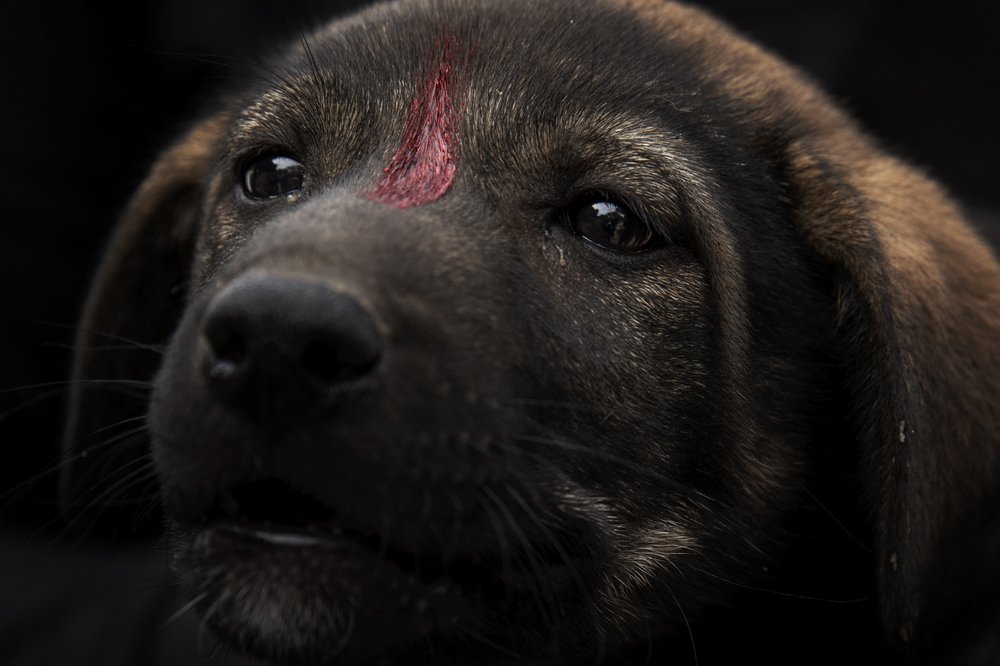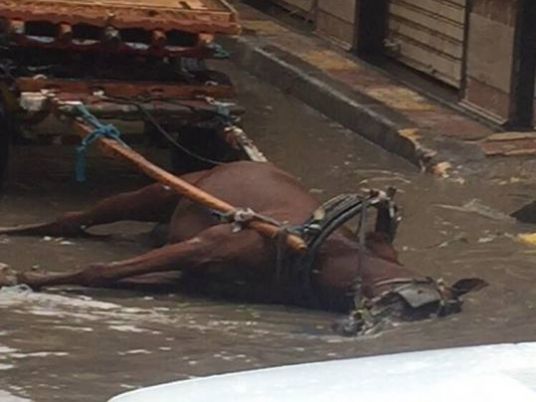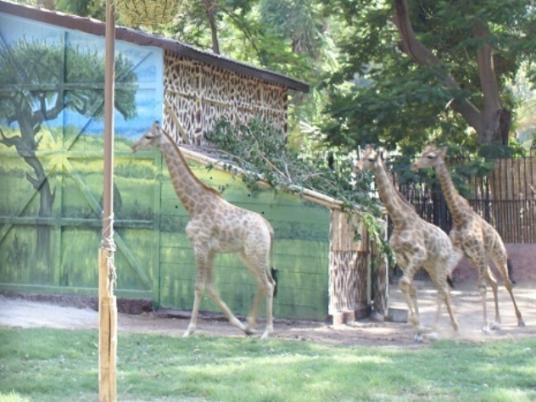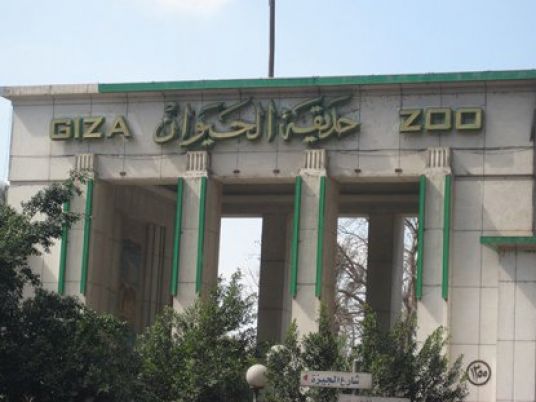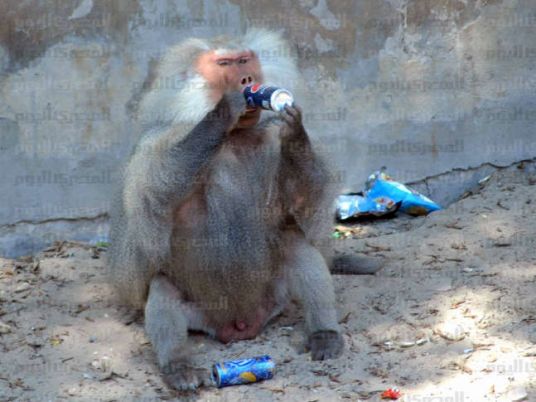
A few days prior to Eid Al-Adha, the Giza governorate decided to supply Giza Zoo’s visitors and other public gardens with 250,000 garbage bags to help keep the zoo clean, as it is a popular place for people to come to during the Eid vacation.
An official source told Al-Wafd newspaper that a detailed plan has been made to cope with the crowds and maintain the zoo's standards. The source also pointed out that Eid vacation was cancelled for all veterinarians and zoo staff.
Giza Zoo received more than 150,000 visitors, mostly children, during the Eid Al-Fitr holidays this year, bringing the total number of visitors to zoos in Cairo and the provinces to approximately 750,000 visitors in 2015, according to Fatma Tamam, the president of the Central Administration of Zoos.

Source: Al-Masry Al-Youm
“The zoo's entrances were increased to 18 entrances in order to prevent the overcrowding of visitors at the same doors,” the source said.
He further pointed out that the zoo has contracted with a security company to provide 24 hour security during Eid to minimize any attempts toward sexual harassment.
The source also mentioned that fire trucks will be on hand to manage any emergency cases. Many new seats have also been placed throughout the zoo to provide people with more rest options.

Source: Al-Masry Al-Youm
The zoo's ugly side
Though former Prime Minister Ibrahim Mehleb opened a zoological museum at the Giza Zoo last month, which is considered the first of its kind in the Middle East, there has been a noticeable deterioration in conditions at the Giza Zoo recently, particularly among the animals.
During the Eid Al-Fitr vacation, photos published by media shed light on the woes facing the Giza Zoo, including a decrease in the number of animals, an increase in garbage strewn everywhere, funding issues, inadequate facilities and the failure to educate visitors or protect animals from them.
One photo, which was published by Al-Masry Al-Youm and quickly went viral (below), showed a baboon drinking Pepsi from a can thrown into his cage, sparking controversy among animal activists.

Source: Al-Masry Al-Youm
Moreover, a video published by the news website Masrawy in 2014 showed footage of teens laughing as they shot at a flustered lioness in the zoo with a pellet gun.
Giza Zoo was labeled in a Global Post article as “one of the worst zoos in the world” in 2010, especially after being expelled from the World Association of Zoos and Aquariums in 2004. The article attributed the expulsion to many reasons, including the killing of two gorillas which were suspected of being infected with the Ebola virus, along with some birds that died from the avian flu in 2006 and two camels that were killed by men in 2008.
The article's author believed that the Giza Zoo was in fact more of a business, where “illegal personal payment [is] received by zookeepers who are allowing the visitors to play with any animal they want, including bears, lion cubs, elephants, tigers and seals."

Source: Al-Masry Al-Youm
In May 2013, three American black bears died after two female bears fought over a male partner, according to Giza Zoo official statement. Shortly thereafter, Al-Watan newspaper reported that they died due to a sedative overdose, which caused two to fall over, breaking bones, and one to drown.

Source: Al-Masry Al-Youm
“The animals' behavior in Egyptian zoos is totally abnormal,” the head of the Monufiya University Natural Resources Survey Department Omar Tamam, a natural reserves professor, said in a 2012 interview with Egypt Independent.
“Animals hurt each other in three cases: when they aren’t fed well, when they are kept in narrow places and sometimes during the mating season. However, the photos taken of the wounded wolves in Fayoum Zoo show carelessness, because wolves don’t hurt each other during mating season,“ he said.
Fadya Abbas, the most senior veterinarian at the Giza Zoo, disagreed. He said it is normal for male animals to fight during mating season and wound each other, and for old animals to lose their teeth and tusks, which affects their nutrition.
“We can’t provide them with dentures, but keepers help them overcome this problem by cutting the food into small pieces and putting it in with long iron rods to feed them in their mouths,” she said.
Another incident that occured at the end of 2013 involved a female giraffe at the Giza Zoo. It accidentally wrapped its neck around a wire found among garbage bags and subsequently died. Animal rights activist Mona Khalil said the accident happened following a series of negligent acts by zoo officials. She considers the zoo a waste of public money.
Most recently, a famous orangutan called Bongo died at the zoo in August 2015, becoming the victim of a scorching heat wave that swept the country.

Source: Al-Masry Al-Youm
"The country’s zoos do not provide animals with the environments they need to survive and breed," Tamam said.
He further explained that zoos are all built on very limited pieces of land that can only be used for breeding a small number of animals. Although Giza Zoo is the biggest zoo in the country and contains more than 200 different species of animals, its 80 acres of land are not suitable for breeding more than 10 species.
“The air is polluted, the water is contaminated, the cages are narrow and the nutrition is really bad, as zoos purchase the cheapest food on the market,” Tamam said
An animal rights group called “Occupy for Animals” released a long detailed report enriched with photos entitled “Dying in Egypt”. It highlights many wounded, diseased and emaciated animals on their website, calling for closure of all zoos in Egypt.
Among the photos were pictures of severely injured wolves in Fayoum Zoo, a baboon living in a small, dirty cage in Tanta Zoo, a deer severely infected by a skin disease at Giza Zoo, a starving lion and a tumor-ridden camel suffering at the Alexandria Zoo. The shocking photos have sparked anger among Internet users in Egypt and beyond.
Revitalization or closure?
The Occupy for Animals group has started a campaign on its website, demanding that seven government zoos be shut down. The zoos are referred to as “hell holes” that shame Egypt. Other users created Facebook pages such as “Help rescue animals in Egypt zoos” and “Please help us save the lions, tigers and wolves that are starving in Egypt’s zoos” to direct authorities’ attention to the suffering animals.
“I have been calling and lobbying to revitalize the government zoos in Egypt for years,” said Dina Zulfikar, one of the country’s most dedicated animal welfare activists and a member of the central zoos supervision committee. “I wanted the zoo authorities to close down the zoos and turn them into botanical gardens so the animals could be transferred elsewhere and be safe.”
Zulfikar says she is deeply concerned by the number of violations happening in these zoos and the lack of care and attention given to the confined beasts.
The animals are kept in cages with concrete floors that are not covered in leaves or sand, she says. Elephants are chained with ropes that are less than a meter long, and felines are often harassed and poked with iron rods by cage keepers so that they roar in front of the visitors.
Modern zoos, Zulfikar says, have two main roles: conservation and education. Zoos must be considered rescue centers for endangered species that are threatened with extinction or stray animals that have no place to live.
Zoos should also inform the public about animals by letting them watch how they behave, she says. But, she says, government zoos in the country are incapable of providing care for the animals and must leave the mission of protecting wildlife to the Environment Ministry, in collaboration with specialized vets.
According to Zulfikar, government zoos sell animals to private places such as circuses and private zoos without making sure these places have the minimum standards animals require to remain healthy. They also allow visitors to take photos with lion cubs and baby chimpanzees, even though these animals can transfer certain diseases to humans.
Giza Zoo could be considered paradise compared to other government zoos, howver, because it receives the largest budget and has the most senior vets. But Zulfikar says Giza Zoo does not even have a fluoroscope device to check felines for rotten teeth, or any other tools necessary for periodic tests on animals.
The location at which the zoo sits is very polluted, she adds, saying it is no longer appropriate to keep animals there. Other experts agree with Zulfikar and say government zoos are not fit to function.
Meanwhile, a group of animal welfare activists submitted a proposal to the government for the establishment of a national park, which they hope to turn into a conservation and rescue center in which people could see animals living in their natural environments.
Because this would require land encompassing more than 500 acres, they need the government’s permission to start construction.
“This project may be a glimpse of hope for those poor animals,” Zulfikar says.
On the other hand Alaa Morsy, a technical office manager of the General Organization of Veterinary Services, criticized the animal welfare activists. He says he does not see any point in attacking government zoos.
“Every animal is exposed to disease and every animal dies like everything else on the planet,” he says. “When they saw the animals in cages, they considered this mistreatment because they want the animals to live in open parks, like a safari.”
He says activists are not considering that such a park would cost billions of pounds that Egypt doesn’t have.
“If we turned it into a safari, as they want, the ticket wouldn’t be less than LE250 and the poor people would be deprived from the enjoyment of watching animals,” he says.
Morsy says all the zoos’ vets and keepers are experts who know how to deal with animals. “When animals get sick, we take all the required procedures and treat them in a suitable way,” he says.
Others supported Morsy's viewpoint, such as Abbas, who said international organizations have been satisfied by the zoo’s performance.
According to Abbas, the zoo recently joined the African Union of Zoos and is on its way to join the International Federation of Zoos.
Abbas said the animals are always provided with enough food and healthcare and have longer lives than animals in the wild. “They eat better than people who live in slum areas," she said.
She accused activists of trying to distort the image of Egyptian zoos and deliberately taking photos of wounded animals. She also denied allegations that keepers were poking animals with iron rods to make them roar.
Abbas says one of the main problems they face is that Egyptian law does not allow euthanasia for old or sick animals, unlike zoos outside the country. She says the zoo’s vets are qualified and sometimes attend training courses run by well-known experts abroad.
Some have accused zoos of allowing the illegal trafficking of animals, but Abbas refutes these claims, saying that all the animals have microchips for identification to prevent trafficking. She defends the zoo’s practices, saying the animals are treated very well and the activists only focus on negative things.
"We are very sad because no one appreciates us,” she says. “We are trying to develop the zoos and make a lot of repairs and improvements, and we need people to help support us instead of attacking the zoos and asking for them to be shut down.”

